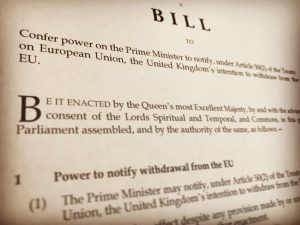By Prof Phil Syrpis, Professor of EU Law (University of Bristol Law School)
 This blog is written after the European Council conclusions were agreed yesterday, on 21 March, on the assumption, which is widely shared, that the EU’s extension plan is accepted by the UK. It is in two parts. In the first, I explain the nature of the choices ahead. In the second, I seek to make a positive case for revoking the A50 notification.
This blog is written after the European Council conclusions were agreed yesterday, on 21 March, on the assumption, which is widely shared, that the EU’s extension plan is accepted by the UK. It is in two parts. In the first, I explain the nature of the choices ahead. In the second, I seek to make a positive case for revoking the A50 notification.
The choices ahead
As has been the case for a while now, there are four possible outcomes to the Brexit process.
- The UK leaves the EU under the Withdrawal Agreement
- The UK leaves the EU with no deal
- The UK leaves the EU under a different deal
- The UK does not leave the EU
The first option is Theresa May’s preferred outcome: that we leave the EU under the terms set by the Withdrawal Agreement. Under the terms of the conclusions, the European Council agreed to an extension until 22 May ‘provided the withdrawal agreement is approved by the House of Commons next week’. The European Council reiterates that there can be no reopening of the Withdrawal Agreement, adding that ‘any unilateral comment, statement or other act should be compatible with the letter and the spirit of the Withdrawal Agreement’. This looks very much like the ‘technical extension’ Theresa May asked for in her letter of 20 March, with the 22 May date chosen so that the UK leaves the EU before the elections to the European Parliament occur, and with a clear indication that no sugar-coating of the backstop will be tolerated. (more…)



